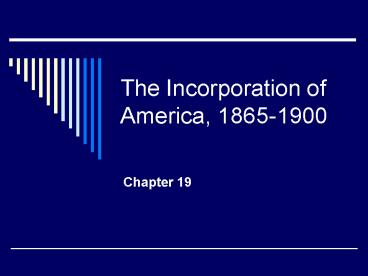The Incorporation of America, 1865-1900 - PowerPoint PPT Presentation
1 / 24
Title: The Incorporation of America, 1865-1900
1
The Incorporation of America, 1865-1900
- Chapter 19
2
A Revolution in Technology
- Inventions
- Alexander Graham Bell
- Thomas Edison
- Railroads got land grants from govt
- Create national market food supplies to urban
areas - Organized over large distances
- Industry
- By 1900, the U.S. produced 1/3rd of the worlds
industrial goods
3
Mechanization Takes Command
- Increased productivity
- Coal cheap reliable fuel
- Machines increase speed of production dangerous
for workers - Larger businesses economies of scale
- Reorganization of factory labor and management
- Increased volume of goods
- Assembly line production
- Began with meat-packing
4
The Expanding Market for Goods
- Marketing and Merchandising
- Rural Free Delivery post office mail system
- Sears, Roebuck Montgomery Ward mail order
- Chain stores
- Department stores
- Advertising firms
5
New Immigration
- Southern Eastern Europe
- Darker skin and eye color
- Illiterate Unskilled
- Jewish, Eastern Orthodox, Catholic
- Settled in dirty, crowded cities
- Xenophobia fear of foreigners
- Prejudice against different ethnicities
- Changes in immigration law first efforts at
restriction
6
The Wage System
- More Americans working for wages
- Immigrants met demands of new industries for
labor periodic depressions threw millions out
of jobs - Dangerous, tedious, 12 hour days
- Changed employer/employee relations
- Women moved into clerical positions retail
sales - Racism kept Blacks and Chinese out of most
skilled positions
7
Social Darwinism What Social Classes Owe to
Each Other
- Herbert Spencer Social Darwinism
- Poor are less fit
- Helping them hurts society
- William Graham Sumner
- Only a few are capable of putting aside selfish
pleasures to produce capital - Members of the working class deserve to be poor
they are lazy
8
Gospel of Wealth
- Andrew Carnegie Gospel of Wealth
- Philanthropy careful redistribution of wealth
back into society for the betterment of others - Poor are mentally and emotionally unfit to cope
with direct aid
9
Mill Towns
- Company owns all property
- Rent houses from company
- Shop at company store
- Company has much control over town government
- Teachers and clergy reinforce companys work ethic
10
Populating the City
- Immigrants accounted for most of the urban growth
- Groups tended to live near their countrymen and
work in similar trades - People moved around in search of better
opportunities - Chinese Exclusion Act 10 yr. ban on immigration
and limited civil rights
11
The Urban Landscape
- Poor - dumbbell tenements overcrowding,
pollution, lack of sanitation, diseases - Wealthy townhouses mansions
- Fires in late 1800s, there is a movement to
beautify the city - Louis Sullivan architect skyscrapers
- Subways and streetcars allow people to live
farther from city center
12
Integration, Combination Merger
- Vertical integration control every step in
production - Andrew Carnegie - Iron ore mines, railroads to
ship to factory, steel factories - Horizontal integration control all one product
- John D. Rockefeller Standard Oil owned 90 of
U.S. refineries
13
Sherman Anti-Trust Act 1890
- Became ineffective due to court interpretations
- Actually speeded up consolidation
14
The Knights of Labor
- Terence Powderly Largest union of the late
1800s - One union for all skilled unskilled, women
minorities included - 8 hr. work day
- Restriction on child labor
- Equal pay for men women
- Graduated income tax
- Decline Haymarket Square incident
- Associated with violence radicalism/anarchy
15
The American Federation of Labor
- Samuel Gompers
- More respectability
- Only skilled workers no minorities
- Pure and simple unionism not radical
- Higher wages family wage earned by men
- Womens role in home, working lowers wages
- Shorter hours
- Collective bargaining
16
The New South An Internal Colony
- Vision of using resources to be a manufacturing
center DID NOT HAPPEN - Northern investors bought up much of what the
South did have for resources manufacturing
17
Southern Labor
- Southern factories rigidly segregated
- Wages were lower than in North
- Widespread use of child and convict labor
- African-Americans men were allowed low-paying
jobs with railroads - African-American women typically worked as maids
or cooks
18
Transformation of the Piedmont Communities
- Southern Virginia to Northern Alabama
- Textiles dozens of small industrial towns
- Tobacco cotton prices fell more children sent
to work in factories to pay family debt - Transition into mill towns
19
The City and the Environment
- Attempts to clean up city led to
- Pollution of rivers
- Garbage dumps on rural lands
- Eventual development of sewage treatment plants
20
Conspicuous Consumption
- Gilded Age Mark Twain
- Horatio Alger Rags to Riches
- Newport Mansions
21
Gentility among the Middle Class
- White, Anglo-Saxon, Protestant (WASP)
- Live in areas away from inner city
- Managers, technicians, engineers
22
Culture in Conflict, Culture in Common - Education
- School system grew rapidly at all levels
- Small minority attended high school or college
- State universities and colleges evolve
- Morrill Land Grant Act - 1862
- Development of liberal arts and professional
schools - Women gained more access to colleges
- Vocational education
- Booker T. Washington Tuskeegee Institute
23
Culture in Conflict, Culture in Common Leisure
Public Space
- Park systems
- Working class middle class had different ideas
- Working class athletic contests
- Middle class cultural activities
- Disputes over alcohol
- Temperance prohibition movements grow
24
Culture in Conflict, Culture in Common National
Pastimes
- Ragtime, vaudeville, sports
- Middle class golf, tennis, croquet
- Working class boxing
- Baseball professional teams and league play
- 1880s segregated
- 1920s - creation of the Negro Leagues































